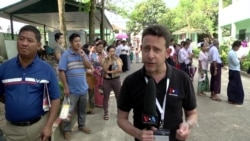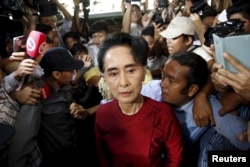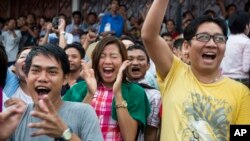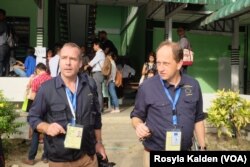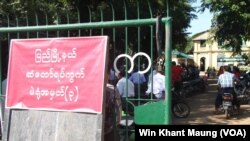Vote counting is underway in Myanmar where turnout was more than 80 percent for the nation's first free general election in a quarter of a century.
Some 32 million people were registered to vote to select from more than 6,000 candidates for both houses of the national parliament and regional assemblies.
The country's most famous voter and candidate, National League for Democracy (NLD) leader Aung San Suu Kyi, was surrounded Sunday by hundreds of supporters and journalists at the polling station near her home in Bahan township in Yangon.
She did not speak or acknowledge the crowd as her bodyguards made a path for her to the ballot box where pandemonium erupted as photographers and television cameramen jostled to capture the scene.
The Nobel Laureate was expected to address her supporters outside NLD headquarters after the polls closed, but she did not appear. The NLD released a statement after the voting ended calling on its supporters to await the results in their own homes and accept the outcome calmly.
U.S. Secretary of State John Kerry congratulated the people of Myanmar, also known as Burma, calling the election "a testament to the courage and sacrifice shown by the people of Burma over many decades."
He said the elections were "an important step forward," despite being "far from perfect."
The Union Election Commission (UEC) is scheduled to issue official tabulations six times a day until next Sunday, beginning Monday morning. However, the opposition is already claiming victories in a number of townships.
Not perfect
The chief European Union election observer in the country, Alexander Lambsdorff, was upbeat early in the day, but added the election was not free of "flaws or shortcomings." The EU team plans to remain in Myanmar for a week during the post-balloting process.
“We have to see this election within a framework which is not openly democratic in the full sense,” remarked Ireland’s former president, Mary Robinson, observing with the Carter Center.
Millions more people, including Rohingya Muslims in Rakhine state, are disenfranchised for a lack of citizenship and other reasons.
It is not yet known how many eligible voters’ names are missing from the rolls at polling stations, but one observer group, Asian Network for Free Elections, described that as its primary concern.
“I am excited and want to participate seriously,” first-time voter Aye Aye Chit told VOA. “But I’m very worried about cheating.”
That was a concern shared by another female voter in Yangon.
“I want it to be fair and square,” said Kyi Kyi Win shortly after casting her ballot. “I have great confidence in the people.”
Voters could be seen patiently standing in the 32 degree heat for more than two hours at some polling states. Some of the elderly were assisted by their children. Others were lifted in their wheelchairs to navigate the steps to ballot boxes.
Sien Kyi, 87, emerged unassisted and declared he was “very happy” to have cast his ballot. “I expect change,” he told VOA. “This is a historic day.”
Accepting results
Myanmar’s president has vowed to cooperate with opposition parties for a stable transition should the election knock him out of power. “The government and the military will respect and accept the results," President Thein Sein said Friday as campaigning concluded. "I will accept the new government formed based on the election results.”
This is Myanmar’s first election since a nominally civilian government was established in 2011, a year after opposition leader Aung San Suu Kyi was freed from house arrest and a ban lifted on her National League for Democracy.
Aung San Suu Kyi and her party scored a resounding victory in 1990 but were prevented from taking power. The NLD is expected to do well again this time against the Union Solidarity and Development Party - USDP - which has the backing of the powerful army.
The ruling party contests the election with one decided advantage: 25 percent of the seats in parliament are reserved for military officers.
Watching closely
Several diplomatic missions, including the United States, joined the United Nations in issuing a statement Friday calling “on all stakeholders to ensure that these elections are conducted peacefully, transparently, and in accordance with the will of the people.”
Britain's ambassador to Myanmar, Julian Braithwaite, said "a vote that is credible, inclusive and transparent and which represents the will of the people would stand as a lasting legacy" for the current government.
At the U.S. State Department, spokesman John Kirby has said key U.S. officials are closely watching the elections as an index of Myanmar's progress from military dictatorship to democracy.
U.S. Ambassador to the U.N. Samantha Power released a statement hailing the election as a "step that would have seemed impossible even five years ago."
Amnesty International said the jailing of peaceful activists, restrictions on free speech and other discrimination against minority groups are a serious problem undermining the electoral process in Myanmar, also known as Burma.
Huge victory needed
Myanmar political experts say the NLD needs to capture 67 percent of the parliamentary seats in Sunday’s election to overcome the military’s veto in the bicameral legislature, known as the Pyidaungsu Hluttaw, which selects the president.
Aung San Suu Kyi, who has urged everyone participating in the general election to ensure a fair, free and smooth vote, is prevented from becoming president even if her party is victorious. The military junta governing in 2008 placed a clause in the constitution barring anyone with a foreign spouse or children from holding the highest office. Aung San Suu Kyi’s late husband was British, as are her two children.
“I don’t believe Aung San Suu Kyi can help us. She married a foreigner. That’s why foreigners might govern our country if she wins this election,” Ma Win May, a villager from Sake Gyi on the outskirts of Yangon, said at a rally held Friday by the government-organized USDP.
Speaking to reporters Thursday at her residence, Aung San Suu Kyi said if the NLD prevails she “will be above the president.”
Her comment has some observers, not only in Myanmar, apprehensive. She did not explain her remarks.
“The president should be under the law. Everybody should be under the law,” David Steinberg, distinguished professor of Asian studies at Georgetown University in Washington, told VOA. “All of a sudden I think she is saying she would not be subject to that law. So this is a very important deviation from what she has said in the past and her beliefs.”
Nearly 7,000 candidates from 91 parties are running for posts in both houses of parliament.
Myanmar, a former British colony, was isolated from most of the world for decades after General Ne Win in 1962 staged a coup, abolishing the Buddhist-majority country’s constitution and its democratic government.
Zinlat Aung and Su Htwe Aung contributed to this report.




